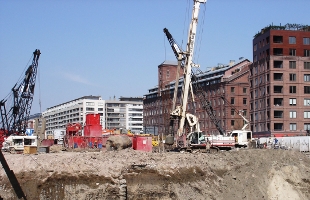The UK’s construction industry is struggling to achieve the growth of other sectors
Construction Industry Growth and the Insurance Implications

February 2019
The UK’s construction industry is struggling to achieve the growth of other sectors such as manufacturing but what is the solution and what are the insurance implications?
Whilst growth in construction has been around 0.4% per year, the slow progress blamed on archaic methods changing little since Caesar’s time, manufacturing has achieved 3.2% growth.
Things are now finally changing and a sea-change could be underway, through developments in a field being closely monitored by Internet giants, Amazon and Google, who are both dipping their toes into the water of modular construction.
Off-site modular building assembly appears to be the route to growth. Flat-pack houses and apartments are now the new thing in construction, with such structures often being built by robots, to a higher standard than many buildings built in a traditional way, on-site.
Modular construction is predicted to comprise up to 40% of construction output within ten years, with internal structures, cladding, wiring, kitchen fitting and more, all being components of a home or office that can be constructed somewhere warm and welcoming, rather than wet and windy.
In fact, Balfour predicts that, by as early as 2020, bricklayers, excavator operators and other types of tradesmen will be replaced by robots and humans will only be employed to work the machines. The build-time of homes is typically cut by six months or more when off-site construction is used, so the advantages are numerous.
These changing scenarios have huge implications for both insurance and health and safety. Public liability insurance will have to cover scenarios in which robots are managing elements of ‘risk’, whilst businesses that are able to make the switch to modular construction will have new insurance needs and health and safety requirements. This could relate to anything from where materials are stocked and how combustible they are, to cyber-crime and the need to protect robotic-controlled assets from cyber criminals and malware.
One of the drawbacks of modular construction is that it comes with an insolvency risk, as a substantial part of a project’s turnover tends to rest in the hands of one sub-contractor, who may be placed under threat by robotic technology and its competitive power. Any other businesses relying on such a subcontractor are likely to be well-advised to consider purchasing Trade Credit Insurance, to protect their payments should their customer become insolvent.
Insurance for all the materials that are held as stock will be necessary and marine cargo insurance may be required, if components are being shipped from overseas.
The permutations of what types of insurance will be required in this new construction world of modular units and robots are numerous, so the best advice is to work with a broker, who will visit the site, examine the business and scenarios that could affect it, and tailor an insurance policy to suit. If you are in a position where you need to consider new types of insurance that have not been relevant before, please get in touch, as we will have an expert who can help.
FPS280
